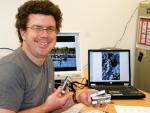Sounding out high-tech solutions
 Electrical & Electronic Engineering Electrical & Electronic Engineering
Crocodile-infested swamps, mosquitoes so fierce they left weals for months, and dripping, energy-sapping heat - that was the environment facing University lecturer Dr Matthew Sorell when asked to help make the latest Rolf de Heer film. Ten Canoes, a cautionary tale of love, lust and revenge gone wrong, is probably the most ambitious film yet from the respected filmmaker whose other works include the multi award-winning The Tracker, starring David Gulpilil. Ten Canoes is a unique film shot on and around the Arafura Swamp in northeastern Arnhem Land: it is the first feature film to be shot entirely in Aboriginal language (predominantly Ganalbingu); its entire cast are people indigenous to the swamp region; and the script was just a guide, allowing the 'Yolngu' (people of Arnhem Land) to tell the story in their own way. David Gulpilil narrates the story in English and his son, 17-year-old Jamie, takes one of the lead roles. The University was approached to help find a low-budget solution to the challenge of recording film-quality sound in this harsh environment where power supply was a key issue and up to 10 actors could be speaking simultaneously in the free-flowing script. Dr Matthew Sorell took up the challenge. He teaches telecommunications and multimedia technology in the School of Electrical and Electronic Engineering and has a longstanding hobby of designing tiny radio microphones. "I couldn't come up with a radio microphone small enough to be concealed on people who haven't got any clothes on but with enough battery power to last all day and be robust enough to cope with the conditions," he said. "Radio mics are also expensive and hard to manage." Eventually Dr Sorell found the solution lay in commercially available technology - flash memory music players. For the filming they were fitted out-of-sight in the actors' hair and could record up to nine hours at a time. The job then was to set up a system for managing the database of recordings to stop overwriting and allow proper synchronisation and sequencing. Two final-year students put together the software suite as their final-year project: Ben Cheney doing a Bachelor of Engineering in IT and Telecommunications, and Adeline Han, who did a double degree in Computer Systems Engineering and Arts. "This wasn't a case of new research but the innovation lay in recognising and utilising the potential in existing technology for a new use and then devising a foolproof computer and software management system for this unique situation," Dr Sorell said. For Dr Sorell this was an eye-opening and rewarding project to be involved in. As well as offering the Yolngu the chance to present their own culture, the film has rekindled forgotten indigenous skills while making props, and started a number of spin-off projects in the local high school and community.
The world premiere of Ten Canoes takes place during the Adelaide Festival on March 19 and the film will be released nationally on June 1 through Palace Films. Story by Robyn Mills
|






